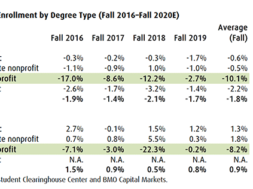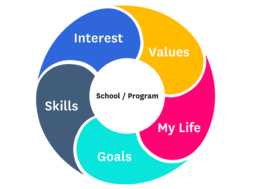
Can Mystery Shopping Save our Sector?
By Vincent Norton, Managing Partner and Consuelo Esparza, Vice President of Marketing & Assessment, Norton Norris, Inc.
With enrollments declining and budgets shrinking, it’s understandable that nonessential expenses be trimmed, cut, or slashed. But is Mystery Shopping “nonessential?” Hardly. Join us for a review of shopping wins – and then continue on and explore a seven-step checklist for getting started.
Let’s start with a quick true story that reinforces the value of shopping. I’ll never forget the experience an evaluator had in 2007 when visiting an open-enrollment school. Let’s just say the college name could have been “high-pressure slime school.” Here’s the short version: Our shopper was in the admissions office, and the representative pointed to a pile of folders and explained how these students had been rejected. Really? I know from doing other work with this institution that rejected admissions applications happened … well … NEVER. In fact, back then, this school even enrolled ability-to-benefit (ATB) students. Yet the unscrupulous representative was using high-pressure and reverse sell tactics to coerce an enrollment. And that’s far from a best practice, even in 2007.
Fast forward nine years and guess how “high pressure slime school” is doing? Terrible. In an effort to trim cost, it downsized the compliance department, abandoned shopping, and has spiraled to near-death. It’s unfortunate, as several proactive measure could have been put in place as a result of ongoing mystery shopping.
On the flip side, let’s share a timeline of school groups that are committed to regular inspection via Mystery Shopping and the results we’ve seen. We’ll call them “squeaky clean.”
These are schools that have regular mystery shops for compliance and customer service. The resulting reports are shared, action steps are taken, talk tracks are created, and re-inspection continues.
So what kind of tangible results have we witnessed? For School A – one of the “squeaky cleans” that we are referencing, we noticed missed opportunities early on that pertained to the customer service side. When scheduling interviews over the phone, few if any conversations included the suggestion of bringing a friend to the interview. Sounds simple, right? Seasoned admissions pros know the power of suggestion and how one interview can result in two enrollments. That is – if a friend comes with. Over a two-year period, we watched the suggestion of “bringing a friend” increase a little, then a little more – and today, guess what? Today, 80 percent of phone conversations at School A include the suggestion to bring a friend. Victory!
For School B – another excellent operator in the “squeaky clean” family – we’ll highlight a very objective, black-and-white item: including specific compliance materials in the interview packet. It should be easy enough to make that happen, right? Not necessarily. When the directive first came out to include specific compliance materials in each interview “take-home folder,” we observed a 40 percent inclusion rate. We reported this back to corporate and even shared the materials we collected in the field. Gradually, we saw improvement. But it was slow coming. Finally, three years later, we now receive compliance disclosures in over 80 percent of our admissions interviews.
Given these results, you may be wondering how sector leaders are using shopping to create a culture of compliance while improving customer service. Here are seven thoughtful steps that every school should implement.
1. Commit to ongoing inspection
Mystery shopping should never be a “one and done.” When institutions make it part of their quarterly plans, regular feedback is received. This feedback is used to compare trends over time and informs continuous improvement. Sector leaders shop monthly or quarterly.
2. Shop the face-to-face interview
Sure you will save budget by commissioning phone shops. But your compliance officer worries most about what is said behind closed doors. Make sure your shopping program concentrates on the admissions interview and the conversations that occur during the initial interview. That’s your primary opportunity to improve customer service, and it is also the area most susceptible to blatant compliance culprits. The most common still include the inflation of outcomes and embellishment of transfer credit opportunities, along with promising financial aid – or, worse yet, the cardinal sin of coaching on the financial aid form.
3. Go beyond using your admissions process as the standard
We’ve seen some shopping that only verifies if the internal prescribed process is being followed. While that’s a good first step, it ignores benchmarking to accreditation and Department of Education standards. The advice here is: Don’t just shop to your process. Make certain the following pain points are being addressed in a compliant manner: tuition, financial aid, outcomes, accreditation, and credit transfer.
4. Develop collaboration between compliance and operations
This is another point that often gets overlooked as school groups work from their internal silos. Effective shopping must progress through the admissions interview on the path toward gathering compliance information. Even though the “owner” may be your compliance department, you can develop a way to share customer service data points. Perhaps it’s simple objective information such as inquiry response time, lobby wait time, and follow-up scheduled. Your operations folks will be very interested in gaining insights from basic opportunities like these. Over time, you should endeavor to share even more interview components that can impact admissions performance.
5. Use results to coach and improve admission and financial aid performance
Unfortunately, we’ve watched well-intentioned but inexperienced administrators rush into the admissions department waving the shop report and hell-bent for someone’s head. The ensuing days are then filled with the representative and often the DOA attempting to defend their actions and prove the report wrong. It’s a terrible waste of time.
The smart school operators know that reports should be thoughtfully socialized. They know how to look for trends.
Of course, you must deal with egregious issues swiftly and document bad behavior with probations or warnings – but the general results can be shared globally. Individual findings should be used to inform improvement plans – not “gotchas.”
6. Don’t boil the ocean
Shopping results may seem daunting – especially at first. Prioritize your action steps, and divide the list between compliance and customer service. Then determine the one or two most important action items in each area that require change, and focus on those specific elements. With proper focus, along with the development of tools and talk tracks for admissions representatives, you should see change on the next round of shopping. But if you try to fix everything at once, your progress will be much slower.
7. Know how to counter the claim that “I’ve been shopped”
Savvy administrators know that the best answer to give when a representative or director of admissions claims they’ve been shopped is, “I hope you did your best and most compliant interview ever.” Even the best shopping program will result in occasional discovery. More often, however, your staff will suspect a prospect who is an informed consumer asking questions. That’s because an effective shopping program increases awareness across admissions and financial aid. Ironically, our experience has been that, most times when clients call and ask if we were shopping their school today, the answer is “no.” That’s because professional shoppers aren’t the only people asking questions. And you should know that commissioned evaluations aren’t the only mystery shops taking place. Your schools are being shopped more than you realize. The competition is shopping, the press may be shopping, and regulatory groups may be shopping. And that may be the most compelling reason to inspect the troops at regular intervals!
VINCE NORTON has been actively involved with Mystery Shopping since 2001. During the past 15 years, the experts at Norton | Norris (Nn) have conducted over 150,000 shops. In 2010 the professionals at Nn were commissioned to review the Government Accountability Office (GAO) report Undercover Testing Finds Colleges Encouraged Fraud and Engaged in Deceptive and Questionable Marketing Practices and to compare over 31 hours of recordings on Senator Tom Harkin’s website with the full report. Their ensuing evaluation revealed that just 15 of the 65 alleged findings could be confirmed by the recordings – and highlighted multiple flaws in the methodology used by GAO undercover operators.
Vince has worked in private nonprofit and with private-sector schools since 1979. He began his own quest for education with an associate degree in business from Davenport College in Grand Rapids, Michigan – an institution with deep roots leading back to private, for-profit education. He ultimately earned an MBA – but credits his love for the sector with the practical knowledge he gleaned at a small private school that specialized in entry-level associate degrees.
Contact Information: Vince Norton // Managing Partner // Norton Norris, Inc. // 312-262-7420 // Vince@nortonnorris.com // http://nortonnorris.com/mystery-shopping/
CONSUELO ESPARZA directs the activities of both Mystery Shopping and Marketing at Nn in her role as vice president of marketing and assessment. She also began her educational endeavors with an associate degree from Robert Morris College in Illinois – a school originally founded by legendary school leader Jack McCartan. Connie went on to earn a Master of Business Administration in marketing. Her 20-year tenure in higher education has included ongoing recognition from the Admissions Marketing Report for individual radio, television, and print ads, as well as overall advertising campaigns. Connie has given back to local education by serving on the school board of Illinois District 201 and the board of directors for a sustainable nonprofit inventory donation corporation – EAL Green.
Contact Information: Consuelo Esparza // Vice President of Marketing & Assessment // Norton Norris, Inc. // 312-262-7404 // Connie@nortonnorris.com // http://nortonnorris.com/mystery-shopping/












